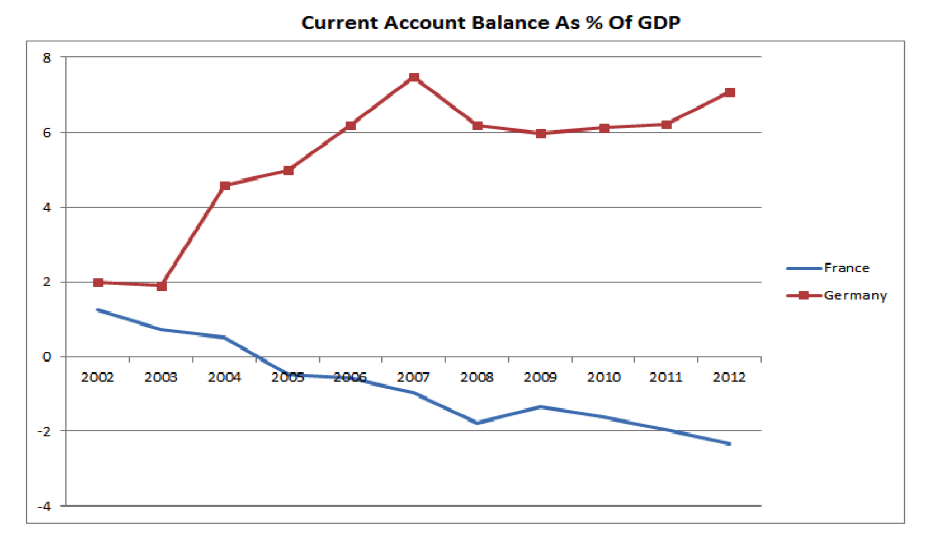With stiff competition these days for the much contested title of the “Sick Man of Europe”, it is somewhat difficult to draw distinction between the various economic basket cases in Eurozone. Nevertheless, the spotlight has recently been turned on France following the downgrade of one of its credit ratings, lower than expected GDP growth data and the President’s collapsing popularity amongst voters. Almost exactly one year ago, The Economist claimed that the country did “not have long to defuse the time-bomb at the heart of Europe”, but will France ever make the necessary bold reforms?
The main issue with France is its dire loss of competiveness compared with Germany over the past decade or so which has unearthed a chasm at the heart of the European economic system.
Given that the Eurozone is slowly evolving into a Germanic bloc with growing current account balances in many of the large nations, France’s ever worsening deficit is a major problem for the Eurocrats in Brussels (and any supporters of the single currency).
The EU’s Economics & Monetary affairs Commissioner, an unelected bureaucrat called Olli Rehn, has recently been ‘upping the ante’ on Paris to deliver on structural reforms to boost the country’s competiveness. Such calls have largely fallen on deaf ears though with a recent pension reform widely criticised as lacking the required ambition to solve the real deep seated problems. On the fiscal front, the French authorities are planning yet more tax rises for 2014 in a country where total taxes are already 46pc of annual economic output – one of the highest tax burdens in the world.
But unfortunately none of the measures that are needed to boost the French economy are likely to happen. Firstly, the President is hugely unpopular and doesn’t have the political capital to deliver what is needed even if his Socialist administration had any worthwhile policies to pursue – something there is little evidence of to date.
Late last week the President’s approval rating fell to just 15pc which was the lowest on record mainly driven by record high unemployment which seems to increase month by month as a matter of course. There are now 3.3m unemployed in France. (Compared with 2.5m in the U.K. where the population is smaller)
Unlike smaller, less influential countries in Europe, the EU has very little say over economic affairs in France with Paris often merely paying lip service to warnings and advice stemming from Brussels. President Hollande said over the summer that the EU “cannot dictate to us what we have to do”, much to the annoyance of Germany and many of the other so called ‘creditor’ countries.
But perhaps the real reason why France will not reform is because there is little or no pressure from the markets to do so. In fact, despite rising public debt amidst an ever weakening economy, French bond yields have fallen since Hollande’s inauguration in 2012 with ten year borrowing costs now trading in yield lower than Britain or the US. Some have called this a bubble, supported by the ECB’s mysterious OMT programme, which will inevitably burst sparking chaos. Nevertheless as it currently stands France is able to finance its budget deficit relatively cheaply whilst maintaining the status quo of an economy that is not fit for purpose.
So given that root and branch reform is unlikely at best, what will happen next? In 2014, the emerging crisis will be political as the jobless toll continues to rise under a President that has always promised to deliver in this area. The French economy needs to be growing at circa 1pc per annum in order to provide jobs growth – something that seems a distance way off. Further bust ups with the EU will materialise over budget deficit compliance, and popular revolts are on the cards which will increasingly cast doubt over the legitimacy of the government itself. All of this will overshadow and impede what the key national priority should be – namely reform.
Tradersdna is a leading digital and social media platform for traders and investors. Tradersdna offers premiere resources for trading and investing education, digital resources for personal finance, market analysis and free trading guides. More about TradersDNA Features: What Does It Take to Become an Aggressive Trader? | Everything You Need to Know About White Label Trading Software | Advantages of Automated Forex Trading










